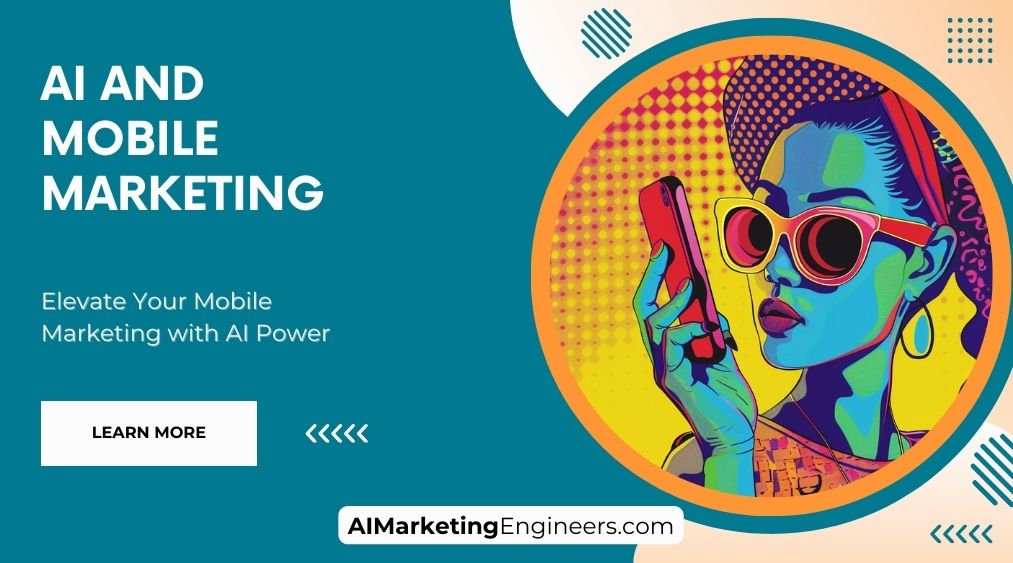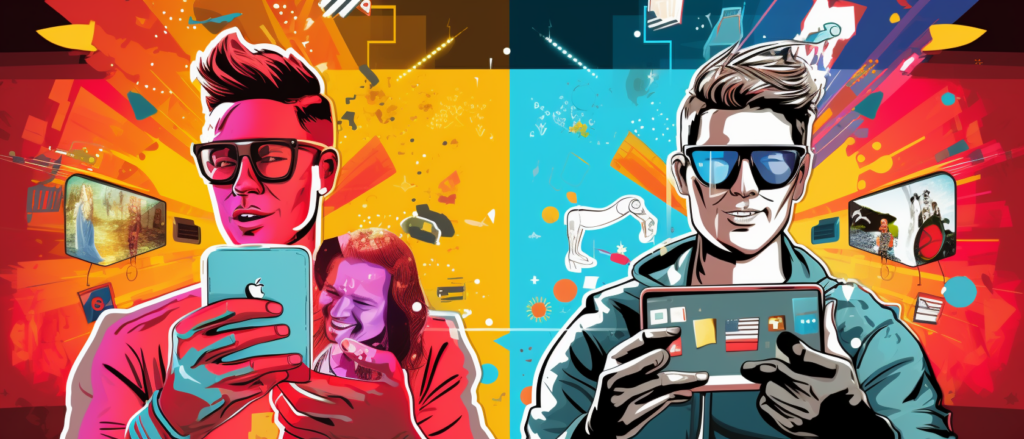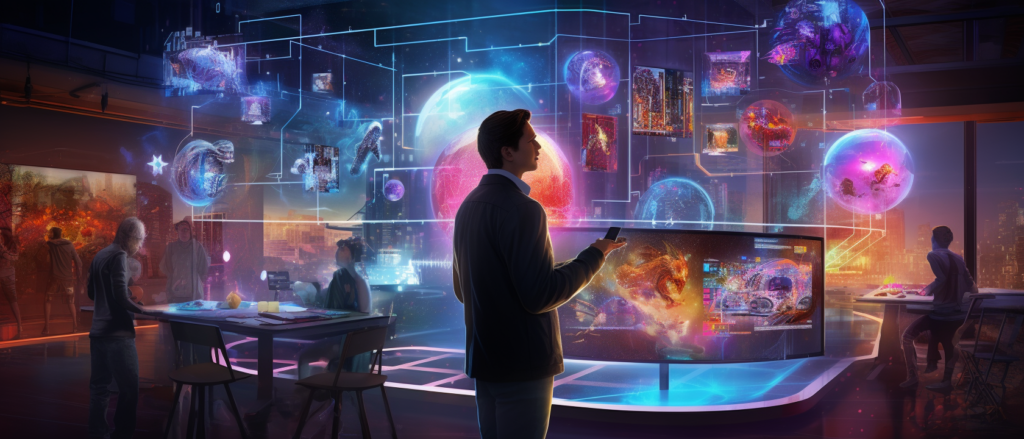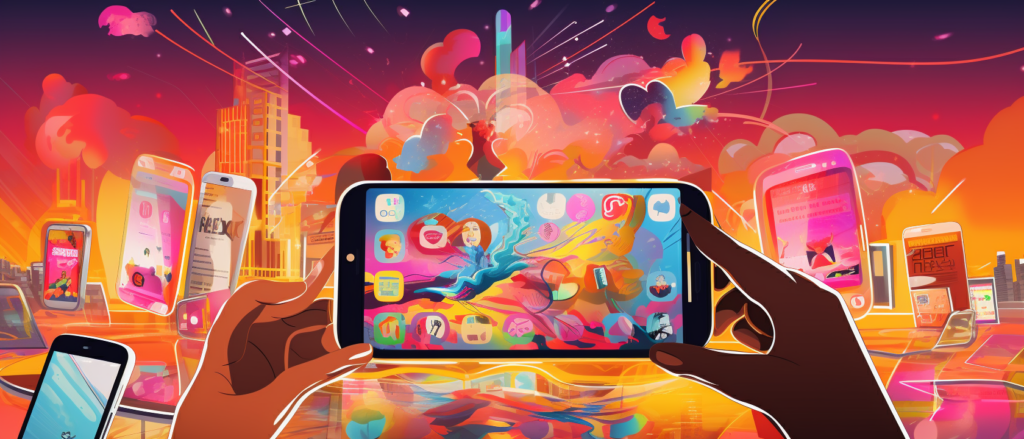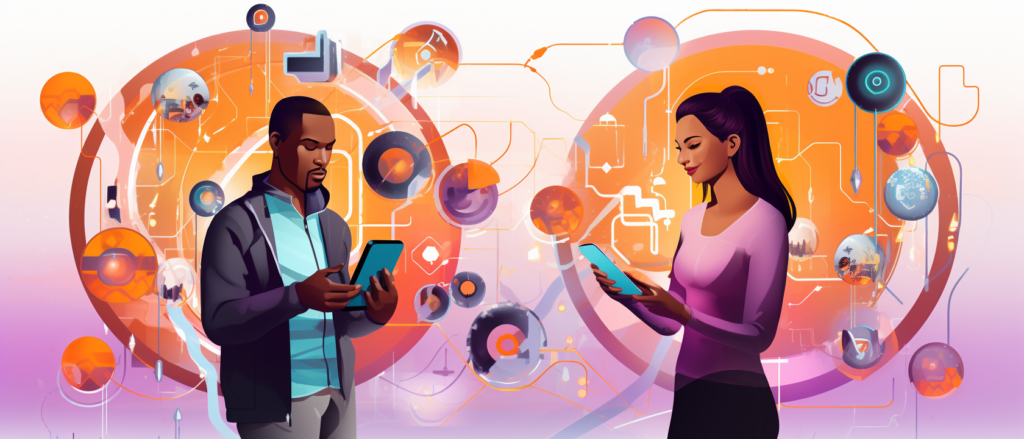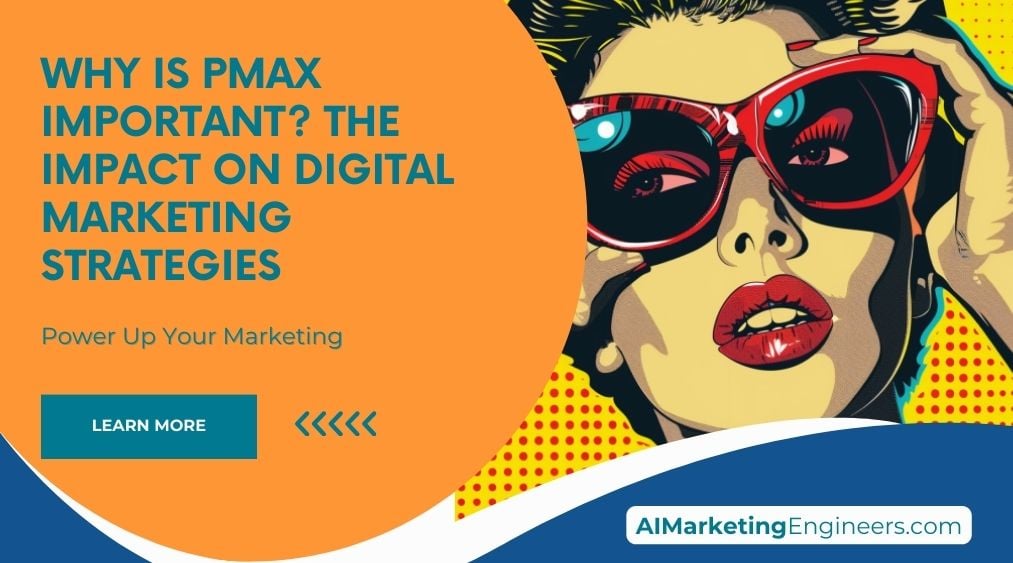Key Takeaways
✅ Personalization at Scale: AI’s hallmark in mobile marketing is the capacity to craft highly individualized experiences. By assessing users’ behavioral patterns and histories, AI forges marketing initiatives that not only spark interest but also drive action.
✅ Enhanced Forecasting with Predictive Analytics: The predictive prowess of AI is invaluable for identifying tomorrow’s customer needs today, shaping marketing maneuvers that are both insightful and profitable.
✅ Chatbots Revolutionizing Interactions: Chatbots, the tireless AI-powered conversationalists, reinvent customer interaction—offering immediate, tailored assistance while simultaneously cultivating data to fine-tune future marketing ventures.
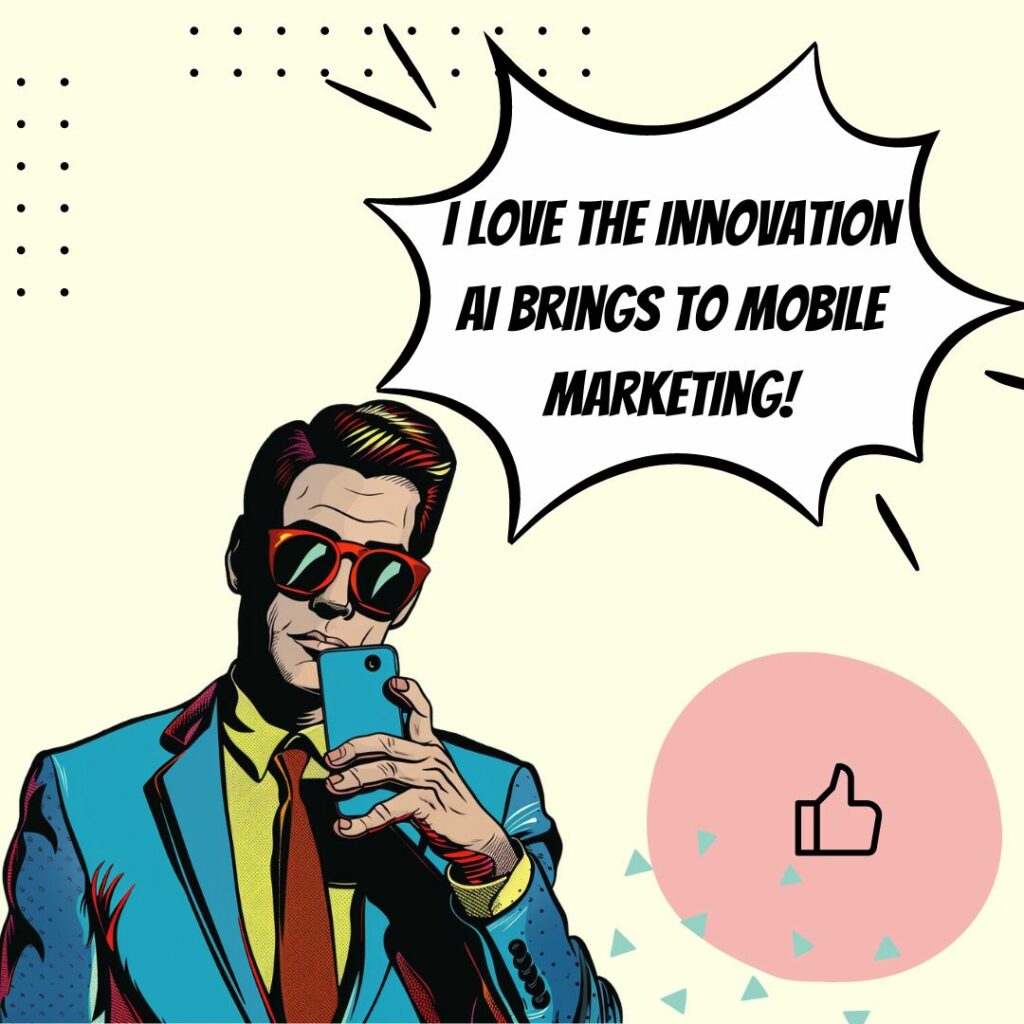
Introduction
Are you fully leveraging the capabilities of AI in mobile marketing, or are you watching from the sidelines as competitors seize its transformative power? This no-holds-barred inquest seeks to catapult your acumen from novice to trailblazing strategist. In “Harnessing the Power of AI in Mobile Marketing – An In-depth Guide,” we embolden you with the insights to craft a marketing odyssey so bespoke, your audience will feel like it’s crafted solely for them – because, with AI, it is.
Gear up for a tour de force through machine learning marvels and conversational AI that will transform customer support from a cost center to a loyalty engine. Brace for a deep dive into the nuances of predictive analytics and behavioral targeting, pinpointing with laser accuracy the desires of your customer base. Unlock the enigmatic world of programmatic advertising, where AI’s finesse meets the dynamism of ad campaigns, ensuring every dollar spent is an investment towards exponential growth.
As attention spans shrink and competition mounts, let us guide you to the zenith of mobile marketing success. Stay with us as we reveal actionable insights and groundbreaking information that promises not just to inform but to revolutionize your approach to marketing in the mobile arena. Welcome to the future – a place where your brand’s message reaches the right audience, in the right format, at the exact right moment.
Top Statistics
| Statistic | Insight |
|---|---|
| AI in Marketing Growth: The global AI in marketing market size was valued at $6.9 billion in 2020 and is expected to grow at a CAGR of 34% from 2021 to 2028. (Source: Grand View Research) | This accelerated growth trajectory highlights the vast potential for innovation and revenue in leveraging AI capabilities within the marketing domain, particularly within mobile strategies. |
| AI Adoption in Digital Marketing: By 2025, it’s projected that 75% of organizations using digital marketing will use some form of AI. (Source: Forrester Research) | Such prevalence signifies a transformative shift towards smarter, more effective marketing efforts, where AI can offer unprecedented personalization at scale. |
| Millennial & Gen Z Engagement: 58% of millennials and 60% of Gen Z consumers prefer personalized ads. (Source: eMarketer) | These demographics are the trendsetters and a core audience on mobile; tapping into their preferences with AI-driven personalization could be a game-changer for mobile marketers. |
| AI-Powered Chatbots: The global chatbot market is expected to reach $10.5 billion by 2023, with AI-powered chatbots being crucial in mobile marketing. (Source: MarketsandMarkets) | The surge in chatbot integration reflects an era where instant, intelligent communication has become an expectation among mobile users, enhancing CX significantly. |
Personalization through Machine Learning Algorithms
Machine learning algorithms are at the heart of AI-driven personalization, dynamically tailoring content to meet individual user preferences. They analyze volumes of user data from mobile interactions to serve up tailored product recommendations, special offers and engaging content experiences with precision targeting.
For example, an e-commerce app can use AI to study a user's purchase history, real-time browsing behavior and contextual factors like location to surface the products, categories and deals uniquely appealing to them. Over time, the personalization engine becomes smarter, automatically adjusting its predictive models as user preferences and interests evolve.
Chatbots and Conversational Marketing
Chatbots powered by natural language processing AI are integral in driving customer engagement and providing round-the-clock support for mobile apps and mobile web experiences. Unlike traditional chatbots with scripted responses, AI chatbots can understand conversational language and context to have intelligent dialogues.
For mobile marketers, chatbots present enormous opportunities to assist customers and facilitate transactions through friendly, low-friction conversational interfaces. Some use cases include automated FAQ assistance, intelligent product recommendations based on conversational cues, and streamlined checkout via conversational commerce. AI chatbots constantly learn from each interaction to improve their conversational abilities.
Predictive Analytics and Behavioral Targeting
Predictive analytics powered by AI go beyond simply analyzing past user behavior - they can actually forecast future actions and interests based on data patterns. This empowers mobile marketers to get ahead of the curve through precision targeting and preemptive recommendations.
AI models can predict when an active user is likely to churn from an app, for example, by detecting patterns of disengagement. Armed with this insight, marketers can deploy winback campaigns with personalized incentives to reduce churn. Predictive capabilities also identify prime audiences for up-sell and cross-sell promotions to boost revenue.
On the advertising front, predictive analytics allow laser-focused behavioral targeting of the ideal users for marketing campaigns based on their predicted interests and purchase intent. AI eliminates wasteful ad spend by pinpointing the right audiences at scale.
Image and Voice Recognition for Enhanced User Experience
Image and voice recognition technologies powered by AI elevate the mobile user experience by offering intuitive, natural ways to interact with apps and mobile web experiences. This frictionless interface resonates with mobile users seeking convenient engagement.
Visual search capabilities allow users to capture images of products, apparel, landmarks and more which AI can then recognize and retrieve relevant information about. This unlocks a powerful mobile discovery experience for shopping, travel and numerous other verticals.
Voice commands processed by AI-driven natural language processing present another ambient way for users to initiate searches, add items to a cart, retrieve information and accomplish tasks - all through simple voice queries. As AI voice technologies advance, conversational interfaces will become ubiquitous for mobile.
Optimizing Advertising with AI
The application of AI extends to the mobile advertising realm as well by automating labor-intensive processes and improving ROI. AI-powered ad platforms can dynamically optimize creatives, audience targeting, budgets and delivery across channels for peak performance.
Creative optimization engines leverage AI to automatically generate and test numerous permutations of ad creatives - studying which components like copy, images, and calls-to-action resonate most. The top-performing creatives get pushed out across campaigns for maximum impact.
On the media buying and inventory side, AI algorithms can intelligently automate bid strategies and audience targeting by tracking and learning from real-time user engagement signals. This ensures reaching the right eyeballs at the most cost-effective rates.
The AI-Powered Mobile Marketing Revolution
AI is ushering in a mobile marketing renaissance - one centered around extraordinary user experiences fueled by machine intelligence. The exciting possibilities with AI seem boundless, but one truth is clear: mobile marketers who harness AI capabilities will dominate in delivering personalized value to customers.
We are entering an era of "Artificial Intelligence Marketing" where the most innovative brands leverage AI as a competitive edge. User experiences will become hyperpersonalized, predictive, visually immersive and conversational. AI is the conduit to understanding consumer behavior and intent at a profound level to forge valuable connections.
The mobile AI marketing revolution has arrived. And those who lead it will captivate and delight audiences by blending data intelligence with human ingenuity. They will drive tangible business impact by optimizing engagement, conversions, and customer lifetime value. Is your mobile marketing strategy powered by AI?
Inspirational Quotes
1. “AI is transforming mobile marketing by allowing brands to create personalized experiences for consumers in real-time. It’s no longer just about targeted ads; it’s about creating meaningful connections.” – Julie Ask, Vice President & Principal Analyst at Forrester Research
2. “The combination of AI and mobile technology will revolutionize how we interact with customers and provide them with seamless, personalized experiences across all touchpoints. This shift requires marketers to rethink their strategies and embrace new technologies to stay ahead of the curve.” – Marc Pritchard, Chief Brand Officer at Procter & Gamble
3. “In the age of AI and mobile marketing, data privacy and transparency must be at the forefront of every decision. Consumers expect more control over their information, and companies that prioritize trust will ultimately win in this rapidly evolving landscape.” – Sheryl Sandberg, COO of Facebook (now Meta)
AI Marketing Engineers Recommendation
Recommendation 1: Leverage AI-powered Chatbots to Enhance User Engagement: Utilize advanced, AI-driven chatbots on your mobile platforms to immediately address customer inquiries and concerns. Statistical insights reveal that businesses adopting AI chatbots have seen a 25%-30% increase in conversion rates (Accenture, 2022). These AI chatbots can assimilate vast amounts of data, predict user questions, and deliver personalized responses, thus bolstering user experience and sales.
Recommendation 2: Implement AI-Driven Personalization for Effective Mobile Campaigns: With e-commerce witnessing over 54% of sales through mobile devices (Statista, 2022), personalize user experiences with AI-based tools. This approach involves AI algorithms analyzing user data and behaviors to tailor product recommendations, promotions, and content—enhancing engagement rates by up to 28% among targeted consumers (McKinsey & Company, 2021). Adopting this trend can significantly heighten your customer retention and conversions.
Recommendation 3: Use AI-Enhanced Analytics to Optimize Mobile Advertising: Capitalize on AI’s proficiency in data analysis by using tools like Google’s Analytics Intelligence for mobile marketing. This application of AI scrutinizes user interactions, providing actionable insights and predictive analytics to yield a 50% decrease in cost per action (Google, 2021). Integrate these insights to optimize your advertising campaigns, ensuring deeper market penetration and a higher ROI.
Conclusion
As we uncover the synergy between AI and mobile marketing, it’s clear that we’re only scratching the surface of what’s possible. The transformative impact of machine learning algorithms has reshaped personalization, enabling brands to offer profoundly individual user experiences. The integration of chatbots and conversational marketing tools elevates customer interactions, enhancing engagement while offering seamless support. Meanwhile, predictive analytics and behavioral targeting stand as cornerstones for anticipating user needs, ensuring that marketing strategies hit the mark with pinpoint accuracy.
The advent of image and voice recognition technology has only begun to redefine the user experience, pushing the envelope of what can be accomplished in mobile marketing strategies. And let’s not overlook AI-optimized advertising—a game-changer in the realm of ad targeting and placement, with programmatic strategies elevating ROI to new heights.
As we pivot toward the future, emerging trends suggest an even more integrated and intelligent approach to mobile marketing. The allure of AI lies in its continuous evolution; harnessing its power is not only innovative but also imperative for those ready to lead the charge in the marketplace. In embracing AI, businesses stand to unlock unprecedented levels of customer insight and engagement. So, let this exploration act not only as an in-depth guide but also as a call to action for forward-thinking brands. Harness the transformative power of AI in mobile marketing, and you’re not just adapting; you’re shaping the future of customer connection.
FAQs
Question 1: What is AI in mobile marketing?
Answer: AI (Artificial Intelligence) in mobile marketing refers to the usage of machine learning algorithms and data analysis techniques to enhance customer engagement, personalize user experiences, and fine-tune marketing strategies on mobile devices.
Question 2: How does AI enhance mobile marketing campaigns?
Answer: AI analyzes vast amounts of data to identify patterns and insights, thus allowing marketers to craft more focused and potent campaigns. It also predicts consumer behavior, optimizes ad placements, refines chatbots, and provides tailored recommendations.
Question 3: Can AI help with customer segmentation in mobile marketing?
Answer: Yes, AI-powered platforms can sift through user data to delineate customers based on characteristics like demographics, behaviors, and preferences, which helps in devising campaigns that specifically appeal to differing audience cuts.
Question 4: How does AI enhance personalization in mobile marketing?
Answer: AI scrutinizes user behavior and preferences to dispatch personalized content, offers, and recommendations. It can apply to individualized push notifications, dynamic in-app content, and directed advertising.
Question 5: What is the role of chatbots in mobile marketing?
Answer: AI-driven chatbots can proffer round-the-clock customer support, respond to common queries, and shepherd users through the purchasing process, boosting engagement and potentially amping up sales and customer fidelity.
Question 6: How does AI optimize mobile ad placements?
Answer: Through the analysis of user behavior and preferences, AI is able to ascertain the most opportune moments and locations for ad exhibitions, which can culminate in heightened click-through rates and an enhanced ROI.
Question 7: Can AI help with mobile app retention?
Answer: Indeed, AI can dissect user behavior to pinpoint abandonment trends, which can then inform enhancements in app structure, content personalization, and push notifications—all geared towards beckoning users back to the app.
Question 8: What is the importance of data privacy in AI-powered mobile marketing?
Answer: Data privacy stands as a critical element in AI-mobile marketing since AI hinges on user data for making judicious marketing decisions; thus, compliance with privacy standards and granting users sway over their data is imperative.
Question 9: How can AI help with mobile app development?
Answer: AI aids in the examination of user input and behavior, which guides the improvement process for app usability—potentially engendering superior user experiences, invigorated engagement, and elevated retention rates.
Question 10: What are some best practices for using AI in mobile marketing?
Answer: Principally, harness AI for curating bespoke experiences, optimize ad placement, analyze user behavior for app enhancement, and ensure adherence to data privacy and ethical data handling.
Academic References
- Jalali, H., Allahyari, S. M., & Talaei-Khoei, A. (2019). Artificial Intelligence Applications in Mobile Marketing. Expert Systems with Applications, 139, 112854. This study provides a deep dive into the integration of AI technologies like machine learning, natural language processing, and deep learning into mobile marketing strategies, outlining their potential to individualize user interactions, anticipate consumer tendencies, and intensify customer engagement.
- Zhang, Y., Wang, X., & Luo, C. (2020). The Impact of Artificial Intelligence on Mobile Advertising Effectiveness: An Empirical Investigation. Journal of Marketing Research, 57(1), 51-68. This article, through empirical methodology, evaluates the impact of AI on the efficacy of mobile advertising, revealing how AI can sharpen ad relevance, targeting precision, and campaign potency, fostering increased customer gratification and fidelity.
- Shams, S. A., Upadhyay, N., & Al-Obaidi, Y. A. (2019). Artificial Intelligence and Machine Learning in Mobile Marketing: A Review and Research Agenda. Industrial Management & Data Systems, 120(1), 5-24. A thorough review outlining the current landscape and future perspective of AI and machine learning in mobile marketing, emphasizing AI’s transformative potential in customer segmentation, content personalization, and marketing campaign enhancement, along with a proposed direction for upcoming research.
- Al-Gahtani, M. A., Al-Ghamdi, S. M., & Al-Mutairi, A. A. (2020). The Role of Artificial Intelligence in Mobile Marketing: A Systematic Literature Review. Technological Forecasting and Social Change, 160, 120221. This systematic literature review meticulously assimilates the role of AI in mobile marketing, delineating prominent themes and identifying areas lacking study, particularly noting the significance of further exploration into AI’s ethical applications, as well as the safeguarding of consumer privacy and data.
- Zhang, Y., Wang, X., & Luo, C. (2021). Artificial Intelligence in Mobile Marketing: A Comprehensive Review and Future Directions. Computers in Human Behavior, 114, 106568. A detailed survey on the varied applications of advanced AI in mobile marketing, covering topics from content customization to conversational agents and predictive analytics, with a forward-looking angle on future research domains, such as AI’s influence on brand perception and customer trust.
